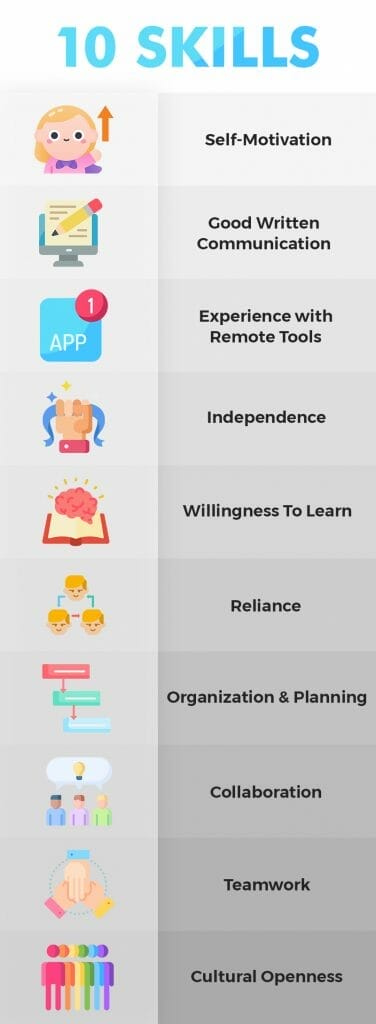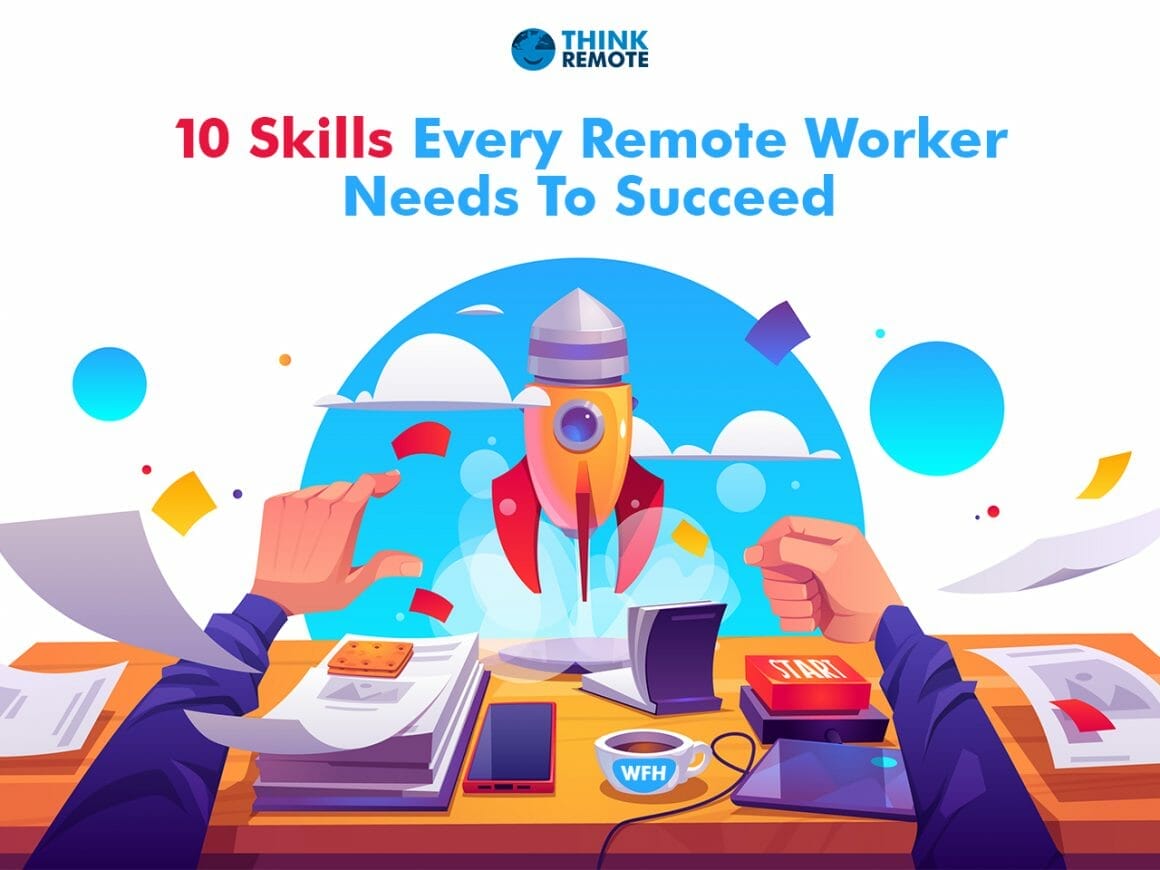Imagine this scenario. You are looking for a new job. Recently, you’ve decided to quit your old job without any warning. Now you’re lost. You have no idea where to go or who to ask for help. All you know for sure is you’ll search for remote jobs. Anyway, you’re feeling hopeless since nowadays everyone wants to get a remote job. Then suddenly, your eyes start shining again. Hundreds of possible remote jobs for your resume you can apply for right now, though something seems wrong. All of these, including in the description “you must have remote worker skills”. So you wonder, what are those? Don’t we all have remote work skills?
Well, the answer is no; not everyone has remote worker skills. These refer to a set of tangible and intangible skills that will help you achieve your maximum potential in remote work jobs. Unlike other jobs, remote positions require committed employees who are willing to work without supervision, people who deliver on time and behave independently. Proofread what Since remote employees work from home, they must be adaptable and effective communicators to perform their best at all times.
Why is it Important to Have Remote Work Skills
According to a Gartner survey, 74% of worldwide companies intend to permanently shift at least some of their employees to remote work post-pandemic. As a result, many industries -like administration, healthcare, or education – are now joining the remote workforce and have started hiring people who have core competencies to succeed in a remote role.
Remote job seekers have more opportunities every day, but that doesn’t necessarily mean they feel prepared for the handful of challenges working from home brings. Though every employee needs to have specific skills and experience to do the job duties, they’ll also need remote worker skills to prosper.
The Best 10 Remote Worker Skills every Remote Worker Needs To Succeed

1. Self-Motivation
When you’re working from home, no one monitors your daily activities. You’re by yourself, so it’s up to you projects to advance or stays as they are. The problem is, if you don’t work on your tasks, deadlines arrive, and you´ll have nothing to deliver.
To work remotely, you need to be self-motivated. It’ll help you prepare for your tasks on time and become a great remote worker. You can create your schedule and routine to help you stay focused. You can also estimate timelines on a shared calendar with your colleagues. To avoid household distractions, you can designate a room in your home to use as an office – assuming this one has a door. It’ll help you separate your personal life from work.
2. Good Written Communication
Though video conferences may be a helpful tool for remote teams, most remote employees prefer written communication – like email or instant messaging. Asynchronous communication allows everyone to contribute accordingly to their own availability. And though these practices don’t guarantee a real-time response, they seem the best option. But not all remote employees know how to communicate through writing.
In a remote environment, every message, email, and assignment must be understandable to achieve effective results. When you write a message to your colleagues, no matter how important it is, make sure it is clear and concise. Proofread what you wrote and put it in the reader’s position. Good written communication will help you develop all your ideas better and will help you to avoid any type of misunderstanding.
3. Experience with Remote Tools
Remote team communication can only be effective if they use the right tools. Teams must select the most valuable tools and put them in lists on their resume. There are hundreds of them. You have tools for video conferencing (Zoom), project management (Basecamp), or instant messaging (Slack). But what you must know is how to use them.
Feeling comfortable accessing the tools your company uses daily will help you develop as a skillful remote worker. Companies usually prioritize and require collaborative employees. Therefore, having reliable management of the tools can contribute to your productivity and results.
4. Independence
Now you plan your schedule. Whether you focus on advancing on projects or strengthening your weaknesses, you’ll decide on your activities every day. And sometimes, remote employers can be demanding.
To work from home, you´ll have to know everything about your role and meet your company’s expectations. Virtual conferences and messaging tools may allow you to communicate with your colleagues, but responses aren’t as quick as walking through your teammate’s office and discussing a project. Plus, most remote managers expect their employees to work by themselves since they can’t keep track of everything.
Solving problems on your own will help you become resourceful and independent. During your first months on the job, ask as many questions as you want, ensure you know everything about the company, so you avoid irritating your colleagues each time you’re lost.
5. Willingness To Learn
Every remote company will need you to work and collaborate effectively in a virtual environment. But like any other job, remote positions require the use of online and digital resources you may have to learn how to use.
Showing your employer and team your willingness to learn will help you feel productive and motivated at work. There is nothing bosses love more than a well-predisposed employee. Each company has its tools and methods to work. Investigate them, try to get into every device you must use. And remember, doubts are a sign you’ve tried them. It’s better to have doubts and ask your boss than to mess things up.
6. Reliance
When you work remotely, you’re able to plan your schedule and availability as you want. But to handle your tasks as you want, you’ll need your team to trust you. Though remote jobs may be flexible and easily adaptable, they are impossible if there’s no trust among team members.
If you’re willing to work and achieve great results, this won’t be a problem. As soon as your teammates prove your productivity and effectiveness, you´ll become reliable to them. In remote workspaces, you must keep your word. If you said you’d do it, you must; if you said you´d be available, you must be available. Since your colleagues can’t see what you’re doing, try to avoid the “buts” when it comes to unaccomplished tasks, unless your dog ate your homework – or, in this case, the computer. Stay away from unnecessary excuses and deliver your assignments on time.
7. Organization and Planning
You know the rules. Working from home is all about learning to be an independent and reliable employee. But to achieve those goals, you must know how to organize your tasks and plan your projects.
Since there’ll be no colleagues to keep you motivated, you’ll have to maintain discipline by yourself to ensure work gets finished on time. First, identify priorities; these will be the first tasks you accomplish. Then create your to-do list with your assignments for you and the rest of your team. Estimate the time each job will require, and get started. Error is human, so don’t hate yourself if your estimations went wrong or you didn’t deliver some tasks on time – as long as you don’t do it every day.
8. Collaboration
When you’re working remotely, collaboration becomes a challenging skill but thankfully we created a guide on how to master that here. Your team will need you to stay connected – during your working hours – so they can reach out to you whenever they need. And the truth is, all team projects imply willingness for collaboration.
Once you’ve built a trusting relationship with your colleagues, the collaboration will come alone. You can report daily check-ins to ensure everything goes as you planned. But if you’ve built a healthy remote team, a simple message on Slack will be enough. Collaboration should be unquestionable on remote teams and a must-have skill for all remote workers.
9. Teamwork
The truth is, many people switch to remote work because they need isolation and individualistic routines. But, working from home doesn’t mean you’re working alone. Though remote teams may distribute across different locations, all employees must work together to achieve good results.
One of the best remote worker skills you can have is to know how to work with a team. With the right tools – like Coda or Basecamp – remote employees should have access to build fantastic collaborative works.
Effective teamwork is the key to success in a remote environment. Communicate, respect, and listen to your teammates. Everyone is equally important and necessary to achieve shared goals.
10. Cultural Openness
One of the most significant advantages of remote work is the variety of cultures combined in one team. Employers aim to hire the best workers, regardless of where they live. So you’ll work with people from all parts of the world, with different cultures, languages, and backgrounds.
Take this as a win. Unlike many of your friends, you’ll work with people from all over the world. You´ll build a fascinating dynamic work culture with your colleagues. Focus on combining your language skills, communication styles, cultural backgrounds, and traditions. It´ll help you create original and attractive projects for a wider audience.
Ready to Test Your Remote Worker Skills?
The pandemic changed the world of work. While some companies might not strictly apply for a remote job forever, they’ll still end up having more flexible routines – like incorporating weekly home office days. As a result, employers will look for individuals who know to work remotely. So you better memorize all of these remote worker skills for your future.
Working from home may have given you fantastic benefits, like flexibility, independence, and not having to commute. But to succeed in a remote work world, you´ll need skills and experience in the field. Increase your willingness to collaborate with your team to help you achieve great results. Improve your communication practices. In remote environments, the more you explain, the better outcomes. And remember, nobody can see what you do, so stay reliable to your teammates. Focus on building a trustworthy relationship with them, and the rest will follow.






